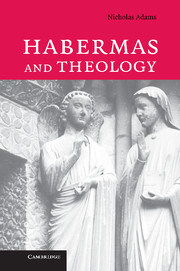Book contents
- Frontmatter
- Contents
- Preface
- 1 Religion in public
- 2 The ideal speech situation
- 3 Authority and distance in tradition
- 4 Sacred and profane
- 5 Universalism
- 6 Theology and political theory
- 7 Theology, social theory and rationalisation
- 8 Modernity's triumph over theology
- 9 Habermas in dialogue with theologians
- 10 Narrative and argument
- 11 Scriptural difference and scriptural reasoning
- List of references
- Index
4 - Sacred and profane
Published online by Cambridge University Press: 23 December 2009
- Frontmatter
- Contents
- Preface
- 1 Religion in public
- 2 The ideal speech situation
- 3 Authority and distance in tradition
- 4 Sacred and profane
- 5 Universalism
- 6 Theology and political theory
- 7 Theology, social theory and rationalisation
- 8 Modernity's triumph over theology
- 9 Habermas in dialogue with theologians
- 10 Narrative and argument
- 11 Scriptural difference and scriptural reasoning
- List of references
- Index
Summary
We have considered Habermas' remarks about tradition in the previous chapter. This chapter investigates the ancestral quality that he ascribes to religion and theology. It is important to remember that the focus of Habermas' discussions is not contemporary religious life and thought, or the development of traditions of ritual and worship. His aim is to explain the forms that moral values take in modern consciousness, and to address problems associated with commitments to moral norms. For Habermas, members of modern societies are properly critical of – he would say ‘distanced from’ – their own traditions, but they suffer, as a kind of by-product, from a ‘motivational deficit’. They know that their traditions see certain practices as moral or immoral, but they find it hard (compared with their ‘traditional’ forebears) to see why they should be committed to or bound to these ways of seeing. Moral values are criticisable for, but less binding on, modern members of traditions, in Habermas' account. He believes that the origin of morality in ‘the sacred’ holds the key to these questions, and he thus elaborates the ways in which sacred forces become profane through reflection.
Theologians need not, as theologians, be very interested in ‘the sacred’ any more than in ‘tradition’. ‘The sacred’ is just as much an anthropological and philosophical term as ‘tradition’. There is no reason for theologians to be anxious about entertaining or even embracing the idea that in modern society there is a loss of the sacred.
- Type
- Chapter
- Information
- Habermas and Theology , pp. 66 - 91Publisher: Cambridge University PressPrint publication year: 2006

